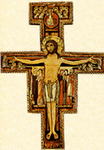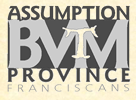Judean wilderness, between Jerusalem and Jericho, near where the Gospels (Matthew & Luke) report Jesus fasting and praying for forty days and having been tempted by the devil.
Lent is a REAL struggle! And it is supposed to be! That's the blessing, though. Not that we are fasting more or praying more or even more generous in our almsgiving. No, rather, that we are allowing the Spirit of God to move through us and to change us more and more into the glorioius image of Jesus Christ!
That is why, on the first Sunday of Lent, in each of the cycles of readings (A, B and C), we find Jesus, just after having had the exhilirating experience of his Baptism in the River Jordan, going up into the desert to pray and to fast, and to struggle.
We know that the desert is the primoridal image in the Old Testament. The Book of Exodus tells us stories of the Israelites fleeing the Egyptians which then leads them into the Sinai Desert where they wander for forty years. It is where God gives Israel the Torah at the hands of Moses the Lawgiver. The Prophet Hosea depicts God affectionately recalling the desert for the People of God as the holy place of their formation as a people belonging uniquely to God!

Like the desert of the first covenant, the desert of our Lent is a crucible in which we are re-formed as God's holy People. We prayerfully accompany those who are preparing for the Sacraments of Christian Initiation (Baptism, Confirmation and Holy Eucharist). We stand together in solidarity with all penitents as we celebrate the Sacrament of Reconicilation, especially favorable during Lent.
The Prophet Moses bringing the Tablets of the Commandments to the Children of Israel from Mount Sinai.
As Franciscan friars, we have donned the "habit of penance", as our holy founder, St. Francis of Assisi, called it. We do so not out of a sense of guilt but rather in the spirit of confident assurance of God's Word which extends mercy "for ever" and "to the thousandth generation to those who fear the LORD."
Our vocation, first as Christians and lived out as friars minor ("lesser brothers") is one of trust in the Lord Jesus. We seek to be in the fire of the crucible of the Lent to be transformed by the hot fire of God's grace into the image of his glorious Son (cf. 2 Corinthians 3:18).
Perhaps the challenges of Lent 2009 have involved famiily disputes, or loss of employment or some other significant financial loss, or the loss of a friendship, or the visit of death to a loved ones. All these can be such difficult situations for us and for those whom we love and care.
Maybe it's time, then, to take stock of our Lent. Have we been looking at our Lenten penance superficially or more deeply as growing into Jesus. Maybe standing in prayer with and for those who are struggling -- in Darfur, in the Middle East, in central Africa, in our own cities and towns -- and who are suffering -- maybe this is the kind of penance (or, better, conversion!) the Lord is calling us to as our Lenten journey is drawing to a close next week. Maybe we can review the First Reading from the Friday after Ash Wednesday, Isaiah 58:1-9 and do a "check-in" with the Lord as to how we are responding to this "great season of grace" (Preface II of Lent).
 A lot of times folks who are serious about engaging Lent find themselves in a real struggle. If they thought that the works of prayer, fasting and almsgiving would be easy, or, if they thought that it might be a good opportunity to practice some kind of pious "diet", I find they are often very mistaken!
A lot of times folks who are serious about engaging Lent find themselves in a real struggle. If they thought that the works of prayer, fasting and almsgiving would be easy, or, if they thought that it might be a good opportunity to practice some kind of pious "diet", I find they are often very mistaken! 



